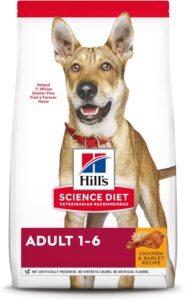Nutrition plays a fundamental role in the overall health and wellbeing of our dogs companions. Just like humans, dogs require a balanced diet to maintain optimal health and wellbeing.
We’ll explore the main nutrients that are crucial for dogs, from protein and fats to vitamins, minerals, and hydration. Whether you’re selecting dog food at the store or considering homemade meals, there are some essential knowledge you need to make informed decisions about your dog’s nutrition.
6 Main Nutrients For Dogs:
Protein
Protein is crucial for building and repairing tissues, supporting the immune system, and maintaining healthy skin and coat. High-quality sources of protein for dogs include meat (such as chicken, beef, turkey, and lamb), fish, eggs, and some plant-based sources like soy and quinoa.
Fats
Fats provide a concentrated source of energy and are essential for the absorption of fat-soluble vitamins (A, D, E, and K). Additionally, fats play a role in maintaining healthy skin and coat, supporting cell function, and providing insulation. Healthy sources of fats for dogs include animal fats, fish oil, flaxseed oil, and canola oil.
Carbohydrates
Carbohydrates can provide a source of energy and fiber. Common sources of carbohydrates in dog food include grains such rice, oats, and barley. Vegetables such as sweet potatoes, peas, and carrots. Fruit such as apples and blueberries. It’s important to ensure that carbohydrates are easily digestible and not present in excessive amounts, especially for dogs with specific dietary needs.
Vitamins
Dogs require a variety of vitamins to support various bodily functions, including immune system function, bone health, and vision. Important vitamins for dogs include vitamin A, vitamin D, vitamin E, and the B vitamins (such as thiamine, riboflavin, niacin, and B12). These vitamins are often included in commercial dog foods, but supplementation may be necessary for dogs with specific health concerns or dietary deficiencies.
Minerals
Minerals are essential for maintaining healthy bones, teeth, muscles, and nerve function in dogs. Important minerals for dogs include calcium, phosphorus, magnesium, potassium, sodium, chloride, iron, zinc, copper, selenium, and iodine. Commercial dog foods are typically formulated to provide the necessary balance of minerals, but supplementation may be required in certain cases.
Water
Water is perhaps the most crucial nutrient for dogs, as it is involved in virtually every physiological process in the body. Adequate hydration is essential for digestion, nutrient absorption, temperature regulation, and the elimination of waste products. Always ensure that your dog has access to fresh, clean water at all times.
When selecting a store bought dog food or preparing homemade meals for your dog, it’s essential to choose high-quality ingredients that provide a balanced combination of these nutrients. Additionally, consulting with a veterinarian or animal nutritionist can help ensure that your dog’s dietary needs are being met based on their age, breed, size, activity level, and any specific health concerns they may have.
Additional credible resources for dog nutrition values:
How much should dogs eat?
When it comes to determining the proper serving portion for your dog, several factors need to be considered, including their age, weight, activity level, and health status.
While I can’t provide specific resources, here are some general guidelines and resources you can utilize to help you determine the appropriate serving size for your dog:
Consult with Your Veterinarian
Your veterinarian is your best resource when it comes to understanding your dog’s unique nutritional needs. They can provide personalized recommendations based on your dog’s age, weight, breed, and any health conditions they may have.
Use Feeding Guides on Dog Food Packaging
Many commercial dog foods provide feeding guidelines on their packaging. These guidelines typically recommend serving sizes based on your dog’s weight. However, keep in mind that these are general recommendations, and your dog’s individual needs may vary.
Online Calculators
Several reputable pet food companies and veterinary websites offer online calculators that can help you estimate your dog’s daily caloric needs and serving portion based on factors such as age, weight, and activity level. These calculators can serve as a helpful starting point for determining portion sizes.
Pet Food Associations and Organizations
Organizations such as the Association of American Feed Control Officials (AAFCO) or the World Small Animal Veterinary Association (WSAVA) may provide educational resources on pet nutrition, including guidelines for feeding portion sizes.
Books and Publications
There are many books available on dog nutrition and feeding practices written by veterinarians, animal nutritionists, and other experts in the field. The Woof Brothers is a good guide to understand dogs nutrition. These resources can provide valuable insights into understanding your dog’s nutritional requirements and determining appropriate feeding portion sizes.
In conclusion, emember that the proper serving portion for your dog may need to be adjusted over time based on factors such as changes in weight, activity level, and health status.
Regularly monitor your dog’s body condition score and consult with your veterinarian if you have any concerns about their feeding regimen.
I feed my dogs Science Diet Hills. I have a miniature poodle and a mix Lab and they love their food. I believe they have some of the best formula and ingredients. They are a bit more money, but I can see the healthy little guys happy and healthy.
Additional resources for dog nutrition:
Contain Affiliate Links





Pingback: Top Human Food that are Good and Safe for Dogs
Pingback: Top 10 Human Foods That Are Dangerous To Dogs -